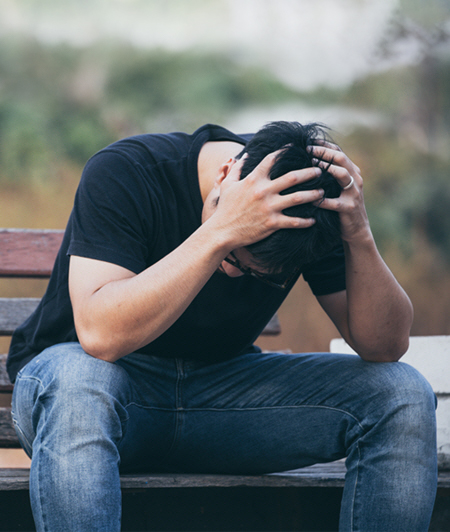 Anxiety has many symptoms.
Anxiety has many symptoms.
Do you often have feelings of apprehension or dread, followed by excessive and irrational fear and worry?
You may be unable to be still and calm, become easily fatigued, or have sleep problems, such as difficulty falling or staying asleep.
Perhaps, you worry about everything, are uncontrollably obsessive, or have difficulty concentrating. Sometimes, your mind goes blank.
You may feel irritable, restless, wound-up, or on-edge. Panic, fear, and nervousness are your constant companions.
Physical issues might come into play, such as chest pain, heart palpitations, dry mouth, nausea, dizziness, numbness of hands or feet, excessive sweating, muscle tension throughout your body, shortness of breath, or hyperventilation.
Although common, anxiety can become persistent.
Anxiety affects 40 million adults in the United States and is more than just a feeling of “jitters and butterflies in the pit of your stomach” that can be shaken off.
Anxiety is an occasional feeling of unease, worry, or fear, and is a normal healthy response to fearful circumstances.
However, an anxiety disorder is when your fear becomes excessive, characterized by behavioral disturbances that are disruptive to your livelihood. Then, it becomes persistent feelings of nervousness and anxiousness, as you constantly anticipate the worst and continually watch for signs of danger to be overcome.
 Depression has its own set of symptoms.
Depression has its own set of symptoms.
Do you often feel like you are not enough, and some days you may even feel completely worthless – like you cannot do anything right?
You may be crippled by questioning your own self-worth. Feelings of irritability, restlessness, and agitations may be your constant companions.
Sleeps patterns can be disruptive by either oversleeping or not sleeping enough. Your weight can fluctuate between excessive gains and losses.
Persistent feelings of sadness may have caused you to lose interest in once enjoyable activities.
You may have difficulty making decisions, feel constantly sluggish and exhausted. Unexplained physical pain arises for no apparent reason.
You have become socially isolated.
Depression is not yours alone.
Over 70 million people in the U.S live with depression.
Depression is more than a bad case of the blues that you can “just snap out of.”
Depression creates a persistent sense of despair and feelings of sadness that result in disabling conditions that can have a significant effect on your work life, school life, and/or family life.
 Anxiety and depression can be two sides of the same coin.
Anxiety and depression can be two sides of the same coin.
Are you feeling overcome with feelings of guilt and shame, followed by crying spells, and unexplained gut-wrenching pain that no one understands?
It is not uncommon for people who have depression to experience anxiety and for someone anxious to experience depression.
Although depression and anxiety are two different conditions, they frequently occur together.
Therefore, overlap in treatments is common, so it is beneficial to understand both conditions.
 Seek help, don’t go it alone.
Seek help, don’t go it alone.
Counseling can help you learn how to alleviate and resolve feelings and symptoms of both anxiety and depression.
Whether you are suffering from anxiety, depression, or both, we are here to help you. Therapy can help you learn healthier ways of coping and resolving your symptoms of anxiety and depression.
Life can be difficult, but you do not have to face your anxiety and depression alone.
A new horizon is on the mend.
Please contact us today (210) 400-2909, so we can help alleviate those symptoms of anxiety and depression.
There are too many beautiful horizons waiting for you.

